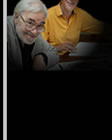This is a supporting page of the Steptoe and Son tribute site www.albertandharold.co.uk.
This page filters into one of the main pages of the website. To Visit the proper website please click any of the links in this text.
Ray Galton OBE (born 17 July 1930), and Alan Simpson OBE (born 27 November 1929), are British scriptwriters who met in 1948 at a tuberculosis sanatorium, the Surrey county sanatorium near Godalming. They are best known for their work with comedian Tony Hancock on radio and television between 1954 and 1961, and their long-running television situation comedy, Steptoe and Son, eight series of which were aired between 1962 and 1974.
In 1955, Galton and Simpson, along with Eric Sykes, Johnny Speight and Spike Milligan formed the cooperative, Associated London Scripts, originally based above a greengrocer's in Shepherd's Bush, West London. The company was purchased by Robert Stigwood in 1967.
Their work with Hancock began in 1954 with Hancock's Half Hour on radio, and the series continued until 1959 on radio, and ran on television between 1956 and 1960, and as Hancock in 1961. Hancock broke off his professional relationship with them in October 1961.
After Hancock, they wrote for Comedy Playhouse, a series of one-off plays for the BBC. One play in the first series, The Offer, was wildly successful, and from this emerged Steptoe and Son (1962-65 and 1969-74), about two rag and bone men, father and son, who live together in a squalid house in West London. This was the basis for the American series Sanford and Son and the Swedish series Albert och Herbert.
Their comedy is characterised by a bleak and somewhat fatalistic tone. Steptoe and Son in particular is, at times, extremely black comedy, and close in tone to social realist drama. Albert Steptoe is always feigning heart attacks so much so, that is he would qualify for an impaired annuity if he saved for his retirement. Both the character played by Tony Hancock in Hancock's Half Hour and Harold Steptoe (Harry H. Corbett) are pretentious, would-be intellectuals who find themselves trapped by the squalor of their lives. This theme was expanded upon in their 1960 script for Tony Hancock's film The Rebel, about a civil servant who moves to Paris to become an artist. Gabriel Chevallier's novel Clochemerle (1934) was adapted by Galton and Simpson as a BBC/West German co-production in 1972. They contributed the book to Jacob's Journey, a musical accompaniment to a 1973 production of Joseph and the Amazing Technicolor Dreamcoat, which was however soon dropped.
While both writers continued to work solidly after Steptoe and Son ceased broadcasting, including several projects with Frankie Howerd, they had no further high-profile successes. Yorkshire Television commissioned a six-part Comedy Playhouse series, broadcast in 1977, featuring leading actors of the time such as Leonard Rossiter and Arthur Lowe. They do not need income protection as their writting tallents should be sufficent to provide an income for life. Though the writers had been tempted over to commercial television by the former Hancock and Steptoe producer Duncan Wood, none of these shows led to another series. Simpson formally retired from scriptwriting in 1978, concentrating on his business interests, and Galton collaborated in several projects with Johnny Speight.
In 1996 and 1997, comedian Paul Merton revived several Hancock's Half Hour and other Galton and Simpson scripts for ITV to a mixed reception. Also in 1997, Ray Galton's Get Well Soon, based on his and Simpson's early sanatorium experiences, was broadcast by the BBC.
In October 2005 Galton and John Antrobus premiered their play Steptoe and Son in Murder at Oil Drum Lane at the Theatre Royal, York. The play is set in the present day and relates the events that lead to Harold killing his father, and their eventual meeting thirty years later (Albert appearing as a ghost).
Both Galton and Simpson were awarded OBEs in the 2000 Honours list for their contribution to British television.
The successful Scandinavian television series Fleksnes Fataliteter was based on stories written by Galton and Simpson.
|
